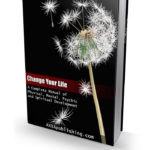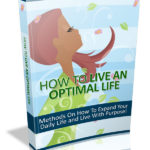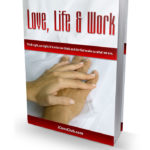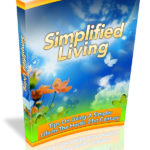
Change Your Life
Exploit your own antagonistic ways by considering your behaviors, beliefs, thoughts, et cetera and turning those thoughts into constructive means that you are motivating yourself to trade. Tackle what is weighing down your mental, physical, and spiritual states. Take the bad quandary and direct it into something congenial. A little humor balm*s my situation from time to time, association play does a great deal for our mind, spirit and body.
Note: spiritual is your set of beliefs, principles, values, morals, standards, etc.
Try to avoid constantly trialing over being energized. Develop your interests, beliefs, morals, standards, principles, values, activities, friendships and start learning how to behave with the emotional pain to insist conquering your personal troubles and further solve your thinking habits. Putting forth coup will put you on the road to success by taking time to develop your skills, motivation, etc.
You want to cultivate innate status, restoring your senses back to its original states to feel your spiritual, mental, and physical being feel renewed. Start Understanding your Mental and Physical Mind to Development of Self-Spiritual.

How To Live An Optimal Life
Summary
What is an optimal life? Is a life where you everything you need and want an optimal life?
How many people do you know who will state that their lives are optimal? If you look around, you might think that happiness has ceased to exist.
But, if you want to make your life optimal, you have to take things in your own hands. You have to shape your own life.
Here is how you can do that, starting today.
Summary
What is an optimal life? Is a life where you everything you need and want an optimal life?
What Is an Optimal Life?
Many people speak about their problems in life. In fact, this is one of the hottest topics of conversations. It doesn’t really matter where you meet someone, all it takes is a friendly smile to start pouring out your life’s woes to them. Everyone does the same. The result is that no one really knows how happy one is. Since everyone is talking about their miseries, it does seem that no one around is leading an optimal life.
This is where the problem lies. We think that the term optimal life should have a definition. We think that we should be able to peg down someone’s life entirely and say, “Ah, now his is an optimal life!” But it doesn’t happen that way, does it? You might think that someone with a lot of money or someone with a beautiful wife must have an optimal life. But when you get to know them, you begin to see the great big problems that lie behind this exterior facade of theirs and you realize that their life is not all that hunky-dory as you thought it to be.
There‟s a great saying I am reminded of here –
If everyone were to throw their problems in a pile, and see everyone else’s, they would grab their own right back.
It‟s true. We think the neighbors are always happier than we are. We think they are leading a more optimal life than we are. But if we were really to sit down and make comparisons, quite likely, we would find our problems to be the least.
So, where are we heading with this? The point I want to make here is that our lives are only as optimal as we want them to be. We have it entirely in our hands how beautiful we want to make our lives. If we want to sit and brood that life is toying with us in every way possible, it is. But if we plan to take things in our hands and not let life jerk us around, it won’t.
We have to plan just how much control we want to give our lives.
An optimal life is a very individualistic thing. For us, an optimal life would be one in which we are completely contented and satisfied with whatever we have. It doesn’t matter whether we are rich or poor – if we are satisfied with what we have, it is an optimal life that we live.
What Do We Need for an Optimal Life?
The general notion all across the planet is that you have an optimal life if you have everything. However, it is not what you have that matters; it is how happy you can be with whatever you have. A person earning just $500 a month has an optimal life if he can survive wonderfully within that and can save too. But even a millionaire is not living optimally if his debts far outstrip his earnings.
So, you see, optimal living is not about money.
What is it about then? Is this about living happily within our family? In a great measure, it is. We are only as happy as our family lives are. Since optimal living is all about contentment, having a pleasant family life becomes one of the essential things for it.
But, again, there are people who have what one might think is the ideal family life – great wife, great kids, etc. – but may still not be happy. Hence, there are a few more things you would need for optimal living. Money and family don’t even begin to scratch the surface actually.
The most important thing you need is actually the way you are. Your perspective, your way of thinking, is much more important in deciding whether you life is optimal. You have to condition yourself into thinking that you are living a great life. When your mental balance is perfectly set, you will find that your life really starts taking a turn for the best.
However, that does not mean you should live in poverty and be happy with it. We need the peripherals – we need the money and the love. These are important ingredients for optimal life, but the realization that these are not the only things should also be had early on. A perfect balance of money, health, family and the right mental spirit will help the most in bringing you toward an optimal life. This is what you need to discover.

Love, Life & Work
By exercise of its faculties the spirit grows, just as a muscle grows strong thru continued use. Expression is necessary. Life is expression, and repression is stagnation–death.
Yet, there can be right and wrong expression. If a man permits his life to run riot and only the animal side of his nature is allowed to express itself, he is repressing his highest and best, and the qualities not used atrophy and die.
Men are punished by their sins, not for them. Sensuality, gluttony, and the life of license repress the life of the spirit, and the soul never blossoms; and this is what it is to lose one’s soul. All adown the centuries thinking men have noted these truths, and again and again we find individuals forsaking in horror the life of the senses and devoting themselves to the life of the spirit. This question of expression through the spirit, or through the senses–through soul or body–has been the pivotal point of all philosophy and the inspiration of all religion.
Every religion is made up of two elements that never mix any more than oil and water mix. A religion is a mechanical mixture, not a chemical combination, of morality and dogma. Dogma is the science of the unseen: the doctrine of the unknown and unknowable. And in order to give this science plausibility, its promulgators have always fastened upon it morality. Morality can and does exist entirely separate and apart from dogma, but dogma is ever a parasite on morality, and the business of the priest is to confuse the two.
But morality and religion never saponify. Morality is simply the question of expressing your life forces–how to use them? You have so much energy; and what will you do with it? And from out the multitude there have always been men to step forward and give you advice for a consideration. Without their supposed influence with the unseen we might not accept their interpretation of what is right and wrong. But with the assurance that their advice is backed up by Deity, followed with an offer of reward if we believe it, and a threat of dire punishment if we do not, the Self-appointed Superior Class has driven men wheresoever it willed. The evolution of formal religions is not a complex process, and the fact that they embody these two unmixable things, dogma and morality, is a very plain and simple truth, easily seen, undisputed by all reasonable men. And be it said that the morality of most religions is good. Love, truth, charity, justice and gentleness are taught in them all. But, like a rule in Greek grammar, there are many exceptions. And so in the morality of religions there are exceptional instances that constantly arise where love, truth, charity, gentleness and justice are waived on suggestion of the Superior Class, that good may follow. Were it not for these exceptions there would be no wars between Christian nations.
The question of how to express your life will probably never down, for the reason that men vary in temperament and inclination. Some men have no capacity for certain sins of the flesh; others there be, who, having lost their inclination for sensuality through too much indulgence, turn ascetics. Yet all sermons have but one theme: how shall life be expressed? Between asceticism and indulgence men and races swing.
Asceticism in our day finds an interesting manifestation in the Trappists, who live on a mountain top, nearly inaccessible, and deprive themselves of almost every vestige of bodily comfort, going without food for days, wearing uncomfortable garments, suffering severe cold; and should one of this community look upon the face of a woman he would think he was in instant danger of damnation. So here we find the extreme instance of men repressing the faculties of the body in order that the spirit may find ample time and opportunity for exercise.
Somewhere between this extreme repression of the monk and the license of the sensualist lies the truth. But just where is the great question; and the desire of one person, who thinks he has discovered the norm, to compel all other men to stop there, has led to war and strife untold. All law centers around this point–what shall men be allowed to do? And so we find statutes to punish “strolling play actors,” “players on fiddles,” “disturbers of the public conscience,” “persons who dance wantonly,” “blasphemers,” and in England there were, in the year 1800, thirty-seven offenses that were legally punishable by death. What expression is right and what is not, is simply a matter of opinion. One religious denomination that now exists does not allow singing; instrumental music has been to some a rock of offense, exciting the spirit through the sense of hearing, to improper thoughts–“through the lascivious pleasing of the lute”; others think dancing wicked, while a few allow pipe-organ music, but draw the line at the violin; while still others use a whole orchestra in their religious service. Some there be who regard pictures as implements of idolatry; while the Hook-and-Eye Baptists look upon buttons as immoral.
Strange evolutions are often witnessed within the life of one individual. For instance, Leo Tolstoy, a great and good man, at one time a sensualist, has now turned ascetic; a common evolution in the lives of the saints. But excellent as this man is, there is yet a grave imperfection in his cosmos which to a degree vitiates the truth he desires to teach: he leaves the element of beauty out of his formula. Not caring for harmony as set forth in color, form and sweet sounds, he is quite willing to deny all others these things which minister to their well-being. There is in most souls a hunger for beauty, just as there is physical hunger. Beauty speaks to their spirits through the senses; but Tolstoy would have your house barren to the verge of hardship. My veneration for Count Tolstoy is profound, yet I mention him here to show the grave danger that lies in allowing any man, even one of the wisest of men, to dictate to us what is best. We ourselves are the better judges. Most of the frightful cruelties inflicted on men during the past have arisen simply out of a difference of opinion that arose through a difference in temperament. The question is as alive to-day as it was two thousand years ago–what expression is best? That is, what shall we do to be saved? And concrete absurdity consists in saying that we must all do the same thing. Whether the race will ever grow to a point where men will be willing to leave the matter of life-expression to the individual is a question; but the millennium will never arrive until men cease trying to compel all other men to live after one pattern.
Most people are anxious to do what is best for themselves and least harmful for others. The average man now has intelligence enough: Utopia is not far off, if the self-appointed folk who rule us, and teach us for a consideration, would only be willing to do unto others as they would be done by, that is to say, mind their own business and cease coveting things that belong to other people. War among nations and strife among individuals is a result of the covetous spirit to possess.
A little more patience, a little more charity for all, a little more love; with less bowing down to the past, and the silent ignoring of pretended authority; a brave looking forward to the future, with more self-confidence and more faith in our fellow men, and the race will be ripe for a great burst of life and light.

Simplified Living
Foreword
Simplifying may some of the times be overwhelming. The sum of stuff you have in your life and the sum of things you have to do may be too huge a mountain to undertake.
However you don’t have to simplify it all at once. Do one matter at a time, and take little steps. You’ll get there, and have fun doing it.
As a matter of fact, you are able to do small but important things today to begin living the simple life.
Simplified Living
Tips On Living A Simpler Life In The Hectic 21st Century
Synopsis
A big percentage of our energy use comes from the gas we utilize to drive our cars. With gas prices surging higher by the day, driving is costly not only in terms of energy utilization, but likewise personal and family budgets. Bicycling makes a simple and healthy alternative to driving and may help save energy, which not only betters our country’s energy use problem, but may also help you hold onto your income in the bargain.